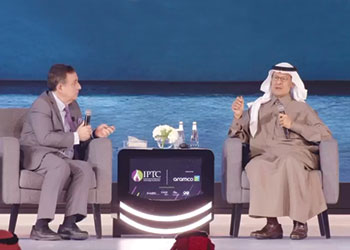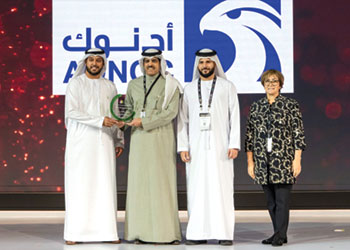
 Prince Abdulaziz speaks at IPTC 2024
Prince Abdulaziz speaks at IPTC 2024
Energy security is not just the responsibility of Saudi Arabia. It's the responsibility of all energy producers and energy consumers, Prince Abdulaziz tells IPTC
Prince Abdulaziz bin Salman Al Saud, Saudi Arabia’s Energy Minister, stated energy transition as a reason behind the country’s decision to halt production capacity at 12 million barrels per day (mbpd) from its earlier decision of 13 mbpd.
"I think we have postponed this investment, simply because we're transitioning, and transitioning means that our oil company became a hydrocarbon company and now it's becoming an energy company," he said.
He was speaking at the 16th edition of the International Petroleum Technology Conference (IPTC) held at the Dhahran Expo from February 12-14.
The event was hosted by Aramco and held under the patronage of Prince Saud Bin Nayef Bin Abdulaziz Al-Saud, Governor of The Eastern Province.
The event contributes to advancing the petroleum industry in Saudi Arabia as a sustainable energy supplier and bring decarbonisation learnings to other key countries across the Mena region.
In January this year, Aramco said it would "maintain its maximum sustainable capacity (MSC) at 12 million barrels per day (mbpd), and not to continue increasing to 13 mbpd".
This was followed by the decision to halt two major projects.
Prince Abdulaziz suggested that Manifa and Safaniyah the world’s largest offshore oilfield had been postponed.
Instead, he said, money will be put into several sources of energy, including oil and gas, geothermal, chemicals and renewables.
"We are going to be, as we have been saying all along, the country that produces every source of energy. Aramco will be involved in quite a few of these things, including downstream," he said at IPTC.
The transition will help the Kingdom save between 950,000 and 1 million barrels per day of fuel oil consumed domestically.
Overall, the Kingdom could end up saving up to 4.7 mbpd if taken into account natural gas liquids (NGLs) and production from Khafji, Prince Abdulaziz suggested.
WHAT LIES AHEAD & KSA’s CONCERNS
Prince Abdulaziz said the future problem with regard to energy security would not be oil. "It will be renewables and the mining industry, but also the source of these materials that will constitute the very essence of the new energy of the world."
Saudi Arabia has played a key role in maintaining stability in the global oil markets. However, Prince Abdulaziz lamented that the Kingdom was not recognised for its efforts.
In reference, he said emergency stocks (by IEA members) were utilised for commercial purposes in 2022 and not to address market shortages.
"Why should we then be the last country to hold energy capacity or emergency capacities, when it is not appreciated or recognised," he asked.
Prince Abdulaziz also referred to the September 2019 Abqaiq–Khurais attacks and said Saudi Arabia was able to mitigate an energy crisis in just two and a half days.
"That tells you a lot about the resilience, the capability, the competence and the commitment. But again, I ask you, was it recognised."
He added: "Why should we be the guardian of something that we hold a bit of? Certainly, the quest is much bigger than us. And that's why I've been lately saying that energy security is not just the responsibility of Saudi Arabia. It's the responsibility of all energy producers and energy consumers."
Referring to the changing dynamics of the energy industry, Prince Abdulaziz said: "We want to make sure people understand that we used to maintain 1.5 to 2 million barrels per day of spare capacity, because energy security in the 70s, 80s and 90s was more dependent on oil. But look what happened in 2022. Gas was the problem."
He said energy security in the future will be broader and in a bigger context.
"We owe it actually to ourselves to start with and to the rest of our colleagues in Opec and Opec+ that we really believe we are doing a remarkable job attending to this task (of market stability), because not only are we helping ourselves, but we are helping the industry," Prince Abdulaziz said.
He said: "We believe we are helping the world economy because there is nothing ruinous – as we saw in 2022 – to the world economy than an unstable energy market."
The 17th edition of IPTC will be hosted by Petronas and co-hosted by SLB in Kuala Lumpur, Malaysia from February 18–20, 2025.
* The OGN energy magazine was a media supporter of IPTC 2024.
By Abdulaziz Khattak





































































